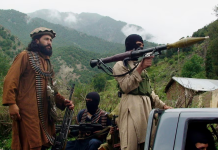KABUL, APR 27: The 7th of Sawr, 1357 (April 27, 1978), marks a critical point in Afghanistan’s modern history, when the People’s Democratic Party staged a coup and overthrew the first republic of Afghanistan.
The Islamic Emirate, in a statement, condemned the Sawr coup and stressed that this action paved the way for the former Soviet Union’s “invasion” of Afghan soil.
A statement released by the Islamic Emirate’s spokesperson’s office said: “In the month of Sawr, 1357 Hijri Solar year, the communists, by carrying out a military coup against the then-government, paved the way for the former Soviet Union to invade the sacred territory of the brave Muslim Afghan nation.”
The Islamic Emirate further stressed the need to protect the “Sharia-based” system and declared that now is the time for all Afghans to act in unity and commitment to safeguard the country’s independence and security.
On the 7th of Sawr, 1357, Mohammad Daoud Khan, the then-President of Afghanistan who had founded the first R
republic, was assassinated along with 18 members of his family at the Presidential Palace, leading to the republic’s fall.
The coup, which began with the sound of cannons and gunfire, was the starting point of major historical changes in Afghanistan.
Armored tanks and military helicopters attacked the Presidential Palace early in the morning on the 7th of Sawr, marking the first coup against Afghanistan’s republic.
On the 8th of Sawr, 1371 (April 28, 1992), after 14 years of war and resistance, the Mujahideen succeeded in overthrowing the last communist regime led by Dr. Najibullah and took control of Afghanistan.
After the Mujahideen’s victory, Sibghatullah Mujaddadi became the head of the interim administration for two months, after which Burhanuddin Rabbani assumed power. However, Rabbani’s government faced numerous challenges, and conflicts among the Jihadi leaders intensified significantly.

















